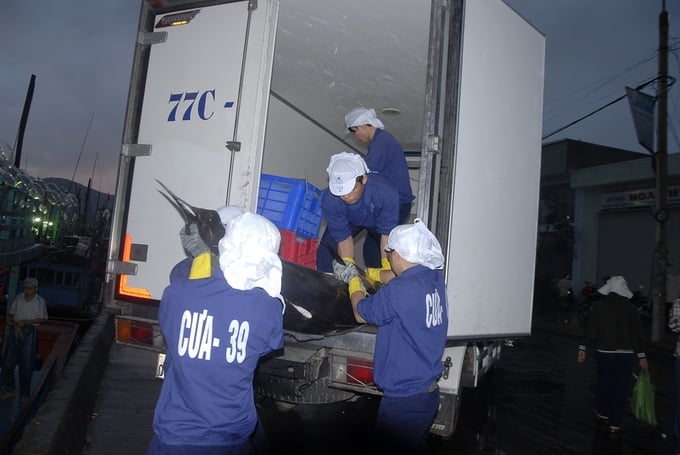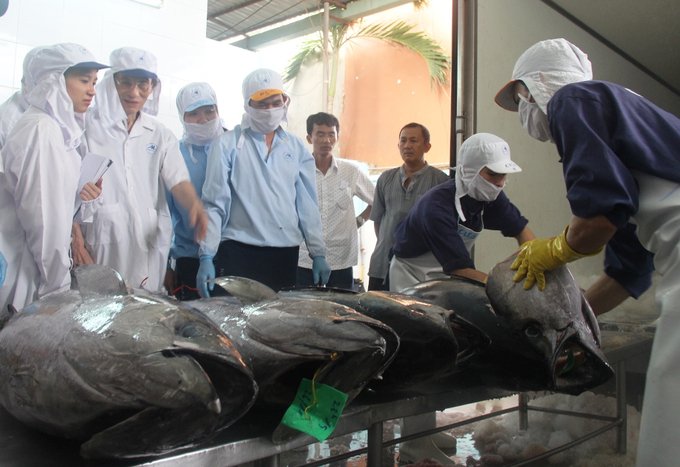November 27, 2025 | 03:49 GMT +7
November 27, 2025 | 03:49 GMT +7
Hotline: 0913.378.918
November 27, 2025 | 03:49 GMT +7
Hotline: 0913.378.918
According to the local Fisheries Association, seafood processing and export businesses in Binh Dinh Province have strictly complied with regulations and procedures pertaining to product origin, food safety and hygiene standards, processing procedures, and anti-IUU fishing over the last seven years.
Additionally, these businesses have actively encouraged their partner fishing vessel owners to refrain from engaging in IUU fishing. Notably, they refuse to purchase seafood with unverified origin or products from vessels that fail to comply with regulations on port entry, exit, or cargo handling.
Cao Thi Kim Lan, General Director of Binh Dinh Fisheries Joint Stock Company (BIDIFISCO), noted that her company has faced challenges in recent years due to the European Commission's (EC) "yellow card" warning. Following the EC’s warning on Vietnam's seafood, all shipments exported by BIDIFISCO to the European market are subject to 100% inspection. As a result, this process has caused delays in the supplying of goods to customers and a significant increase in costs.

Binh Dinh Fisheries Joint Stock Company procuring seafood from local fishermen at Quy Nhon fishing port. Photo: V.D.T.
“If Vietnam fails to lift the ‘yellow card,’ our other international partners may impose additional technical barriers, which further complicate business operations. Consequently, in support of the province's government, our company aims to contribute to the effort by sourcing only legally harvested seafood, complemented by verified and certified origin in compliance with regulations. We will be committed to the cause despite ongoing raw material shortages,” shared General Director Cao Thi Kim Lan.
Improving traceability of caught seafood
According to Vo Thi Ha, General Director of Ngoc Ha Fisheries Co., Ltd., located in Tram Quan Bac Ward, Hoai Nhon Town, Binh Dinh Province, the process of procuring seafood from local fishermen was previously undemanding, requiring minimal procedures. However, in addition to the enhanced control on raw material procurement, businesses must now comply with stricter standard requirements.
In addition to complying with new regulations, seafood procurement businesses in Binh Dinh also collaborate with local governments, regulatory agencies, and fishing ports to remind fishermen to follow anti-IUU fishing guidelines, thereby ensuring clear and traceable origins for their catch.
“We regularly remind fishing vessel owners, who are also our partners, about maintaining accurate fishing logs. Specifically, we stress that discrepancies between the recorded and actual quantities must not exceed 20%, as exceeding this limit results in penalties. Misrecorded coordinates or discrepancies found during port inspections will also lead to refusal of entry. I interact with local fishermen daily, so I often share the regulations I know. Over time, they become accustomed to these practices, and their log entries now meet requirements,” General Director Vo Thi Ha explained.

Processing businesses in Binh Dinh Province are currently procuring seafood in compliance with strict regulations and enhanced control over raw material inputs. Photo: V.D.T.
According to Tran Van Phuc, General Director of the Binh Dinh Province's Department of Agriculture and Rural Development, the Binh Dinh Provincial People’s Committee recently issued a plan to implement key and immediate tasks and solutions with the aim of eliminating IUU fishing. The plan requires relevant authorities to strengthen inspection and control efforts with the aim of ensuring that all seafood catches are unloaded at ports. The plan also calls for enhanced monitoring of seafood landings at fishing piers, traditional offloading points, and coastal landing sites within the province.
Efforts include collecting and submitting purchase and transshipment logs, as well as fishing logs, ensuring their quality and cross-checking them against data from the Vessel Monitoring System (VMS). Local authorities are also tasked with verifying the traceability of caught seafood to ensure compliance with regulations.
“Binh Dinh currently houses six seafood processing and export businesses. These companies have fully implemented the requirements and recommendations set forth by the European Commission. Local authorities frequently remind these businesses of their responsibilities, thereby contributing to the province's effort to lift the IUU ‘yellow card’ in the near future,” emphasized General Director Tran Van Phuc.
Despite Binh Dinh’s efforts to combat illegal, unreported, and unregulated (IUU) fishing, violations involving local fishing vessels operating in foreign waters continue to be a challenge. Since the beginning of 2024, local authorities have detained 10 fishing vessels from fishermen in Phu Cat and Phu My districts. Among this group, seven vessels were operating, anchoring, or departing from Ba Ria-Vung Tau province, while three originated from Kien Giang province.
Translated by Nguyen Hai Long
/2025/11/26/4909-2-154329_878.jpg)
(VAN) Pearl grouper farming in HDPE cages not only delivers economic efficiency but also contributes to protecting the environment, creating jobs, and promoting marine-based experiential tourism.

(VAN) The model of making a living under the forest canopy through the agroforestry system in Van Son commune, Bac Ninh province, is expected to generate an annual income of approximately VND 30 million/ha.

(VAN) Many enterprises in Can Tho are harnessing natural energy and reducing greenhouse gas emissions in their production processes, thereby contributing to the promotion of a sustainable green transition.
/2025/11/24/3536-2-112800_176.jpg)
(VAN) Dong Nai now has tens of thousands of hectares of forests certified for sustainable management, and this area will continue to be expanded in the coming period.

(VAN) Vinh Ha hamlet (Dai Xuyen commune, Hanoi) is shifting away from small-scale farming as households adopt bioscurity into their breeder chicken models.

(VAN) Heavy rains make aquatic species more vulnerable to disease. Proactive water management and high-tech systems help farmers prevent outbreaks and protect yields.

(VAN) Greenhouses are shifting production mindsets in Binh Lu commune, enabling farmers to ‘weather the sun and rain’ and secure stable vegetable harvests throughout the year.